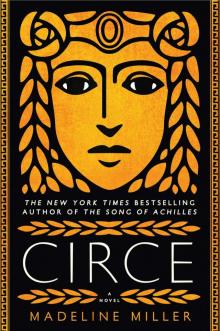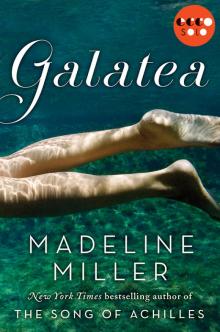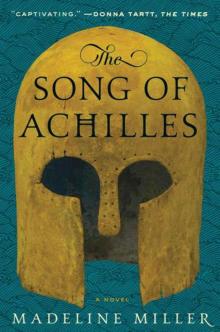- Home
- Madeline Miller
Galatea Page 2
Galatea Read online
Page 2
My husband came to the doorway. “Why are you laughing?”
Paphos said, “Why not?” She was taller than the other girls, and long-limbed. She wasn’t afraid of him.
I said, “Darling, I’m so sorry we disturbed you.”
“She does not say she is sorry.”
“She is still a baby,” I said.
“I’m not a baby,” Paphos said.
“Then apologize,” he said.
“You poor thing, you look half-starved,” I said to him. “Have you not eaten? Paphos, sweetheart, let me talk to your father a moment.”
She left, and I saw him grind his teeth at how obediently she did it. He said, “You love her more than me.”
Of course not, of course not. My hands stroked his hair, long and greasy from brooding. It is only that she is too smart for that governess, I said. She is bored, and I cannot teach her anything. She needs a tutor.
He said, A tutor.
And I said, Yes, another tutor would make everything better, and then we would not bother you. He was quiet, and I hoped he was considering it, but when I saw his face it was taut and angry, as though he would break the skin. He seized my arm, and he said, You never blush.
I couldn’t think to speak, that is how hard he held me.
He said, You do not blush anymore, that is the thing. You apologize and apologize, but you do not blush. Are you shameless now?
No, never, I said. He grabbed the neck of my dress and yanked, but he was not as strong as he wished to be, and it did not tear. He yanked again and again, then pushed me to the floor and held me there, yanking, until the fabric gave way and I was naked.
I covered myself with my hands and made soft noises like a child. Blush, blush, I prayed. Blush for him, or he will kill you. And I was fortunate, for it was warm in the room, and I was angry, and ashamed too, for I feared that Paphos could hear us, and the blood came to my cheeks and I blushed.
He said, “So you are not completely lost to me.” And he sent me to bed, and after, in the torchlight, he wondered at the marks on me, the red around my neck, and the purple on my arms and chest where he had gripped me. He rubbed at them, as though they were stains, not bruises. “The color is perfect,” he said, “look.” And he held up the mirror so I could see. “You make the rarest canvas, love.”
I HAD A little money, coins my husband had dropped from his messy purses, things I had found in the street. I had shoes that I stole from the governess, leather, not gold, that were meant for traipsing up and down dusty roads. I had a cloak that I stole from my husband. Paphos had her own, because I had insisted she got cold easily, though she was like me and was never cold, nor hot either. And I said to her, “Shall we go to the countryside?”
And she said, “Daddy will not let us,” and I said, “I know, so let’s not tell him.”
We did not make it beyond the next town, because everyone noticed us. A woman and a girl, pale as milk? Yes, just that way.
THE NURSE LET me lay in the wet for a long time before she came with the dry linens. She bunched the mattress reeds so that they stuck at me worse than ever, and refused to answer me, no matter what I said to her, even when I told her how beautiful her mole was. I wasn’t even lying. At that moment it seemed to have a handsomeness of its own.
After, she gave me a bath. She didn’t use a cloth, just her hand, dipped in the water. I think she hoped that I would complain about it, but I didn’t, because it must be a miserable thing to wash people if you hate it. Next came the rose oil that my husband pays extra for, which she put on as though she was making bread, slapping my skin with both hands. She meant it to hurt, but I sort of liked the vigor of it, the sound and the way my skin went pink.
When she was gone, I wiped off as much of the rose oil as I could on the sheets. The tea had passed through me and my head was clear. I thought, My daughter is ten. Paphos is ten.
THE NEXT DAY, the doctor frowned at me. “Are you unwell?”
“No,” I said. “I am very well.”
He was about to say, “Then why are you lying down?” but that would have meant admitting that I was not sick to begin with. Ha, I thought.
“I am feeling so calm,” I said. “Calm and well.”
“Hmmm,” he said.
“I hope my husband comes today,” I said. “I miss him terribly.”
“He said he would,” the doctor said.
“How wonderful,” I said. “What wonderful news.”
The jingling came late, but I wasn’t impatient. I arranged myself just so. The door opened, and my husband sent the nurses away. I heard the lock catch.
“Ah, my beauty is asleep.”
And I said, “No, I’m not.”
He said, “For your sake, I tell you to lie down, and I will return in a moment when you have collected yourself.”
I said, “I am pregnant.”
He stared. “It is not possible.” Because ever since Paphos, he leaves his seed on my belly.
With the gods, all things are possible, I said. Look at my stomach. I had puffed it a little, so that it looked like a mound. And anyway, he did not know what women looked like. To him, if there was anything, it was strange.
He was pale then; almost as pale as me. “The doctor did not say so.”
“I did not show the doctor, I wanted you to be the first to know. Darling, I’m so happy, we shall have another child, and then another after that. And then—”
But the door had already closed. Later the doctor came, with a different kind of tea. He said, You have to drink this. And I said, Please, will you send the nurse to sit with me while I do?
He said, All right, for he saw that I would cry otherwise. It was amazing how easy it was.
The nurse came, and I said, Will it hurt? I fear it will hurt. And she said, It will hurt a little, and then the blood will come.
I am afraid, I said, and I hid my face in the pillow.
A moment passed, and then I felt her hand on my back. You will be all right, she said. I have done it, and look, I live.
But the baby doesn’t live, I said.
No, she said.
I wept, racking, into the cushions.
You must drink the tea, she said. But her voice was not so sharp as usual.
If only I could go outside, I said. I want to give the baby to the goddess.
The doctor doesn’t allow it.
I waited, and waited, and wept, and at last she said, But the doctor is not here at night.
I WANTED TO roll on the grass like a dog, but I was supposed to be pregnant and suffering so I limped, as though every part of me might break. She brought me the tea, and I held it, sipping. She said, Tell me when the cramping comes.
I sifted the dirt through my fingers. It was dark, and there was only a little moon, which I took to mean that the goddess, if she existed, smiled on me. I said, I think I feel something. Good, she said. We were in the garden, at the back of the house, away from the sea.
I said, I feel something.
Good, she said.
Then I doubled over, screaming. I fell to the ground and screamed again. She hesitated, afraid to touch me.
It hurts, it hurts! Get the doctor! She was trembling, and I felt a little sorry, but not sorry enough.
The doctor, yes. I will go for him. Just give me a moment, his house isn’t far.
As soon as she was gone, I ran. I did not worry about her catching me. She was clever with her fingers, but she was not fast. I smiled and slipped along the road towards the town.
I DID NOT try the door of the house—I knew it would be locked. But there was a tree behind it, an olive, that Paphos used to beg me to climb with her. I kicked off my sandals and stepped up the warm gray branches. I reached, and pulled myself into her window.
I had thought about it all day, if I would
wake her or if I wouldn’t. But seeing her asleep, I could not. She was a child, only ten, and it would frighten her. So I found the pot of sand she liked to keep because it smelled of the sea and spilled a little on the floor. Paphos, I spelled. I would have said more, but that was most of what I knew.
I slipped from her room and went to the front door, which was bolted. I did not have to hurry, because no one would look for me here; had I not run from him before? I eased up the bolt and left the door open a little.
My husband’s workroom was in the far wing, where the light was best. I stood outside the door and though I wasn’t tired anymore from running, my breath was quick. The house was very quiet around me. There were no servants to worry about—my husband did not like them to sleep in the house.
I pushed open the door and saw the girl, glowing in the room’s center. Stone, I told myself, because I was shaking a little. She is stone and she will not wake.
I stepped closer and saw her face. It was pale and pearly, her mouth a soft bow. Her eyes were closed, and she was curled on a stone couch. She looked younger than Paphos because she was so small. She was perfection, every inch of her, from the sweet curls of her ribbons to her sandals painted gold. She had no scabs, and no sand beneath her fingernails. She did not chase the goats, and she did not disobey. You could almost see the flush on her cheeks.
There were silks on her, draped like blankets, and I slipped them off. There was a bracelet of flowers on her wrist, and I pulled it away. I kissed her forehead and whispered, “Daughter, I’m sorry.”
I went to my husband’s room and stood in the doorway. He was flung across the bed and rumpled.
“Ah, my beauty is asleep,” I said.
My husband’s eyes opened and he saw me. I turned and ran. I heard a crash as he tripped over the stool I had left for him in the hall, but then he was up again, almost on the stairs. I fled through the front door and onto the road, and his footsteps slapped behind me. He did not shout, because he didn’t want to waste his breath; it was just the night’s silence and the two of us running through the streets. My lungs ached a little but it didn’t matter, because I wouldn’t need them soon.
The road passed through the town and dipped towards the sea. I was slow and fat from a year of lying in bed, but he had never loved exercise and was fat and slow himself. The dirt gave way to sand, cool and thick beneath my feet, and then I was on the pebbles, which had never hurt me, and then, at last, the waves. I threw myself in, fighting past the breakers to the open sea. A moment later, I heard the splash of him following.
Water was not my element. It dragged at my clothes as I swam. A little farther, I told myself. I could hear him coming, his arms stronger than mine from a lifetime of lifting marble. I felt the water shiver near my foot where he had grabbed and almost caught me. I looked back, and saw how close he was and how far the shore behind. Then his hand seized my ankle and yanked, pulling me to him like a rope, hand over hand, and then he had me up and by the throat, his face pressed to mine.
I think he expected me to fight and claw. I didn’t fight. I seized him close around the ribs, holding my wrists so he could not get free. The sudden weight pulled us both under. He kicked and flailed back to the surface, but I was heavier than he had thought, and the waves slopped at our mouths. Let it be now, I prayed.
At first I thought it was just the cold of the water. It crept up my fingers and my arms, which stiffened around him. He struggled and fought, but my hands were fused together and nothing he tried could break them. Then it was in my legs too, and my belly and my chest, and no matter how he kicked, he could not haul us back up to the air. He hit at me, but it was watery and weak and I felt nothing, just the solid circle of my arms, and the inexorable drag of my body.
He had no chance, really. He was only flesh. We fell through the darkness, and the coolness slid up my neck and bled the color from my lips and cheeks. I thought of Paphos and how clever she was. I thought of her stone sister, peaceful on her couch. We fell through the currents and I thought of how the crabs would come for him, climbing over my pale shoulders. The ocean floor was sandy and soft as pillows. I settled into it and slept.
ABOUT MADELINE MILLER
© by Nina Subin
MADELINE MILLER grew up in Philadelphia, has bachelor’s and master’s degrees in Latin and Ancient Greek from Brown University, and has been teaching both languages for the past nine years. She has also studied at the Yale School of Drama, specializing in adapting classical tales for a modern audience. Her first novel, The Song of Achilles, was awarded the 2012 Orange Prize for Fiction. She lives in Cambridge, Massachusetts.
Visit www.AuthorTracker.com for exclusive information on your favorite HarperCollins authors.
ALSO BY MADELINE MILLER
The Song of Achilles (2012)
CREDITS
Cover by Allison Saltzman
COPYRIGHT
GALATEA. Copyright © 2013 by Madeline Miller. All rights reserved under International and Pan-American Copyright Conventions. By payment of the required fees, you have been granted the nonexclusive, nontransferable right to access and read the text of this e-book on-screen. No part of this text may be reproduced, transmitted, downloaded, decompiled, reverse-engineered, or stored in or introduced into any information storage and retrieval system, in any form or by any means, whether electronic or mechanical, now known or hereinafter invented, without the express written permission of HarperCollins e-books.
EPub Edition AUGUST 2013 ISBN: 9780062319654
Version 08232013
FIRST EDITION
ABOUT THE PUBLISHER
Australia
HarperCollins Publishers (Australia) Pty. Ltd.
Level 13, 201 Elizabeth Street
Sydney, NSW 2000, Australia
http://www.harpercollins.com.au
Canada
HarperCollins Canada
2 Bloor Street East - 20th Floor
Toronto, ON, M4W, 1A8, Canada
http://www.harpercollins.ca
New Zealand
HarperCollins Publishers (New Zealand) Limited
P.O. Box 1
Auckland, New Zealand
http://www.harpercollins.co.nz
United Kingdom
HarperCollins Publishers Ltd.
77-85 Fulham Palace Road
London, W6 8JB, UK
http://www.harpercollins.co.uk
United States
HarperCollins Publishers Inc.
10 East 53rd Street
New York, NY 10022
http://www.harpercollins.com

 Circe
Circe Galatea
Galatea The Song of Achilles
The Song of Achilles